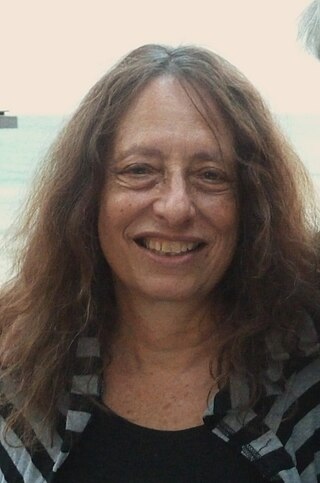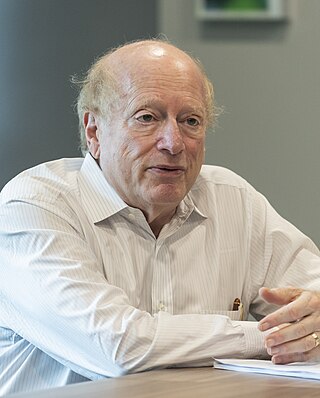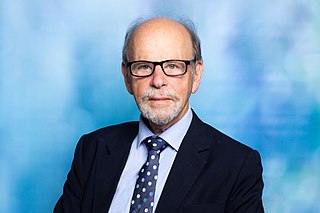Related Research Articles
The separation of powers principle functionally differentiates several types of state power and requires these operations of government to be conceptually and institutionally distinguishable and articulated, thereby maintaining the integrity of each. To put this model into practice, government is divided into structurally independent branches to perform various functions. When each function is allocated strictly to one branch, a government is described as having a high degree of separation; whereas, when one person or branch plays a significant part in the exercise of more than one function, this represents a fusion of powers.
Representative democracy, electoral democracy or indirect democracy is a type of democracy where representatives are elected by the public. Nearly all modern Western-style democracies function as some type of representative democracy: for example, the United Kingdom, Germany, France, and the United States. This is different from direct democracy, where the public votes directly on laws or policies, rather than representatives.

Carol Gilligan is an American feminist, ethicist, and psychologist, best known for her work on ethical community and ethical relationships.

John Hart Ely was an American legal scholar. He was a professor of law at Yale Law School from 1968 to 1973, Harvard Law School from 1973 to 1982, Stanford Law School from 1982 to 1996, and at the University of Miami Law School from 1996 until his death. From 1982 until 1987, he was the 9th dean of Stanford Law School.
Reva B. Siegel is the Nicholas deB. Katzenbach Professor of Law at Yale Law School. Siegel's writing draws on legal history to explore questions of law and inequality, and to analyze how courts interact with representative government and popular movements in interpreting the Constitution. She is currently writing on the role of social movement conflict in guiding constitutional change, addressing this question in recent articles on reproductive rights, originalism and the Second Amendment, the "de facto ERA," and the enforcement of Brown. Her publications include Processes of Constitutional Decisionmaking ; The Constitution in 2020 ; and Directions in Sexual Harassment Law. Professor Siegel received her B.A., M.Phil, and J.D. from Yale University, clerked for Judge Spottswood William Robinson III on the D.C. Circuit, and began teaching at the University of California at Berkeley. She is a member of the American Academy of Arts and Sciences, and is active in the American Society for Legal History, the Association of American Law Schools, the American Constitution Society, in the national organization and as faculty advisor of Yale's chapter. She was elected to the American Philosophical Society in 2018.

Mark Victor Tushnet is an American legal scholar. He specializes in constitutional law and theory, including comparative constitutional law, and is currently the William Nelson Cromwell Professor of Law at Harvard Law School. Tushnet is identified with the critical legal studies movement.
Joe Oloka-Onyango is a Ugandan lawyer and academic. He is a Professor of Law at Makerere University School of Law where he has also formerly been Dean and Director of the Human Rights and Peace Centre (HURIPEC). He is married to Prof Sylvia Tamale, also a lawyer, academic and activist. They have two sons; Kwame Sobukwe Ayepa and Samora Okech Sanga.
Countervailing power, or countervailance, is the idea in political theory that the wielding of power by two or more groups, centers, or sets of interests within a polity can, and often does, yield beneficial effects through productive opposition and containment between opposing forces. As a political concept, it resembles those of agonism, agonistic pluralism, and checks and balances, encapsulated in the often-quoted phrase from Federalist No. 51 that "ambition must be made to counteract ambition." The notion of countervailance has been applied in both politics and economics.

The political philosophy of Immanuel Kant (1724–1804) favoured a classical republican approach. In Perpetual Peace: A Philosophical Sketch (1795), Kant listed several conditions that he thought necessary for ending wars and creating a lasting peace. They included a world of constitutional republics by establishment of political community. His classical republican theory was extended in Doctrine of Right (1797), the first part of Metaphysics of Morals. At the end of the 20th century Kant's political philosophy had been enjoying a remarkable renaissance in English-speaking countries with more major studies in a few years than had appeared in the preceding many decades.

Thio Li-ann is a Singaporean law professor at the National University of Singapore. She was educated at the University of Oxford, Harvard Law School and the University of Cambridge. In January 2007, she was appointed a Nominated Member of Parliament (NMP) in Singapore's 11th Parliament.
Patriarchy is a social system in which positions of authority are primarily held by men. The term patriarchy is used both in anthropology to describe a family or clan controlled by the father or eldest male or group of males, and in feminist theory to describe a broader social structure in which men as a group dominate society.

William Nichol Eskridge Jr. is an American legal scholar who is the John A. Garver Professor of Jurisprudence at Yale Law School. He is one of the most cited law professors in America, ranking fourth overall for the period 2016–2020. He writes primarily on constitutional law, legislation and statutory interpretation, religion, marriage equality, and LGBT rights.

Frances Raday is a professor emerita of Elias Lieberman Chair in Labor Law, Hebrew University of Jerusalem. Raday is currently a professor of law at the Haim Striks Law School at Colman College of Management Academic Studies, where she also acts as president of the Concord Center for Integration of International Law in Israel and as head of the school's graduate programs.
Louis Michael Seidman is the Carmack Waterhouse Professor of Constitutional Law at Georgetown University Law Center in Washington, D.C.. He is a constitutional law scholar and major proponent of the critical legal studies movement. Seidman's 2012 work is On Constitutional Disobedience, where Seidman challenges the viability of political policy arguments made in reference to constitutional obligation.
Constitutionalism is "a compound of ideas, attitudes, and patterns of behavior elaborating the principle that the authority of government derives from and is limited by a body of fundamental law".
Michael J. Perry is an American legal scholar, specializing in constitutional law, human rights, and law and religion.
The United States Constitution has had influence internationally on later constitutions and legal thinking. Its influence appears in similarities of phrasing and borrowed passages in other constitutions, as well as in the principles of the rule of law, separation of powers and recognition of individual rights. The American experience of constitutional amendment and judicial review motivated constitutionalists at times when they were considering the possibilities for their nation's future. Examples include Abraham Lincoln during the American Civil War, his contemporary and ally Benito Juárez of Mexico, the second generation of 19th-century constitutional nationalists José Rizal of the Philippines, and Sun Yat-sen of China, and the framers of the Australian constitution. However, democratizing countries often chose more centralized British or French models of government, particularly the British Westminster system. Since the 1980's, the influence of the United States Constitution has been waning as other countries have created new constitutions or updated older constitutions, a process which Sanford Levinson believes to be more difficult in the United States than in any other country.
Vincent Phillip Muñoz is an American political scientist. He is the Tocqueville Professor in the Department of Political Science and Concurrent Professor of Law at the University of Notre Dame. He is the author of two books on the principles of the American Founding focusing on religious liberty and the separation of church and state in the United States.

James E. Fleming is an American legal scholar who serves as the Paul J. Liacos Professor of Law at the Boston University School of Law. He is a scholar in standard constitutional theory and constitutional interpretation, with special attention to criticizing originalism and defending moral readings of the U.S. Constitution, developing a civic liberalism concerned with protecting rights and instilling civic virtues, and justifying rights to autonomy and equality as central to constitutional self-government.

Sir Jeffrey Jowell is a practising barrister at Blackstone Chambers specialising in public law. He was the inaugural Director of the Bingham Centre for the Rule of Law from 2010 - 2015. He is Emeritus Professor of Public Law at University College London where he was Dean of the Faculty of Laws and a Vice Provost. He is the author of leading publications in his field.
References
- 1 2 3 "David A. J. Richards".
- ↑ "Why Feminism Now? Carol Gilligan and David Richards argue that feminist resistance to patriarchy is the key to saving democracy".
- ↑ "Retribution in Criminal Justice: Violence and its Relation to Manhood (Shakespeare) Seminar".
- ↑ "Bulletin of Information 1977-1978".
- ↑ "Landmark Indian Supreme Court ruling on same-sex intimacy includes multiple citations of David Richards's work".
- ↑ Judith L. Hudson (April–May 1987). "Reviewed Work: Toleration and the Constitution by David A. J. Richards". Michigan Law Review. 85 (5/6): 1183–1187. JSTOR 1289044.
- ↑ Lewis, Thomas (January 1989). "Book Review: Toleration and the Constitution. by David A.J. Richards; Men and Marriage. by George Gilder". Constitutional Commentary.
- ↑ Rothman, Rozann (December 1990). "Foundations of American Constitutionalism. By David A. J. Richards. New York: Oxford University Press, 1989. 315p. $32.50". American Political Science Review. 84 (4): 1407–1408. doi:10.2307/1963321. JSTOR 1963321.
- ↑ "Women, Gays, and the Constitution: The Grounds for Feminism and Gay Rights in Culture and Law. By David A. J. Richards".
- ↑ "Disarming Manhood: Roots of Ethical Resistance, By David A. J. Richards".
- ↑ "The Case for Gay Rights: From Bowers to Lawrence and Beyond by David A. J. Richards".
- ↑ Richards, David A. J. (2015). Why Love Leads to Justice. doi:10.1017/CBO9781316416105. ISBN 978-1-107-12910-8.
- ↑ Wozniak, Steven (2003). "Book Review: Identity and the Case for Gay Rights: Race, Gender, Religion as Analogies. By David A. J. Richards. University of Chicago Press, Chicago, 1999, 201 pp., $14.00 (paperback)". Archives of Sexual Behavior. 32 (5): 475–477. doi:10.1023/A:1025607912898. S2CID 142156931.
- ↑ "Book Reviews: Patriarchal Religion, Sexuality and Gender: A Critique of New Natural Law". ProQuest .
- ↑ Woliver, Laura R. (2011). "The Deepening Darkness: Patriarchy, Resistance, & Democracy's Future by Carol Gilligan and David A. J. Richards". Journal of Women, Politics & Policy. 32: 76–78. doi:10.1080/1554477X.2011.537948. S2CID 142693295.
- ↑ Richards, David A. J. (2010). Fundamentalism in American Religion and Law. doi:10.1017/CBO9780511676031. ISBN 978-0-521-19122-7.
- ↑ "David A.J. Richards, The Rise of Gay Rights and the Fall of the British Empire".
- ↑ "The American Book Awards / Before Columbus Foundation". Archived from the original on 2013-03-13.